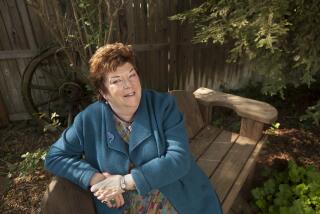Pauline Nightingale, 96; Attorney Fought for Rights of Women Who Work for State
- Share via
The tiny type at the bottom of the job posting was so small, Pauline Nightingale could have easily missed it: “Open to men only.”
That didn’t stop Nightingale from challenging the restriction and landing the job as deputy labor commissioner in the 1940s.
It was one of several battles she fought to expand the rights of women who worked for the state of California. She was instrumental in establishing maternity leave for women and was the first female attorney for the state labor commissioner’s office, her family said.
Nightingale, who also served as a judge on the Workers’ Compensation Appeals Board, died of congestive heart failure Saturday at her home in Roseville, Calif., said her granddaughter, Donna Ragsdale. She was 96.
“I was,” Nightingale told the California Bar Journal in 2002, “always in a man’s world.”
When she graduated from the Los Angeles College of Law in 1932, she often recalled that she was the only woman in her class -- and the class valedictorian.
After struggling in private practice during the Depression, she went to work for the state and became the first woman in the Department of Employment assigned to interview men for job assignments.
At UCLA, Nightingale studied to become a teacher but abandoned that plan when she learned that it required a swimming test. Terrified of water and unsure if she had the patience to teach, she went to work at another male bastion -- her stepfather’s auto parts store -- while attending law school at night.
As a lawyer, the 4-foot-11 Nightingale used her diminutive size to her advantage. Few people expected the mouse to roar.
“She was so cute, but when she opened up her mouth, she would be a tiger,” Ragsdale said. “She learned how to manipulate people with that.”
To be considered for the deputy labor commissioner opening, Nightingale was forced to argue in a hearing that women with law degrees were as worthy as men to apply for the job.
Her tenacity was rewarded in 1942 with a graveyard shift that had her looking for underage workers at bowling alleys and nightclubs. She used her legal skills during lawsuits and hearings over violations.
Eventually, she started doing purely legal work for the labor commission as a senior attorney and, later, as chief counsel.
In the mid-1940s, she took six weeks off to have her daughter Sandra, who survives her. In addition to her granddaughter, Nightingale is survived by two great-grandchildren. Her husband of 53 years, Harold, died in 1988.
When she returned to work after having her baby, Nightingale was told that the state would not allow her to use sick pay to cover her maternity leave. The unpaid time off also was going to cost her seniority and a coveted fringe benefit.
“I didn’t care about the pay as much as I wanted the corner office with the window,” Nightingale told The Times in 1983.
Once again, she fought the status quo, appealing to the state personnel board and winning paid maternity leave. Her case set a precedent, and she moved into the office with a view.
“She was the kind of person who believed in having a purpose and fighting for what you believe in no matter what,” her granddaughter said.
The daughter of Russian immigrants, Nightingale was born May 6, 1909, in New York City to Sam Friedman, a ballet dancer, and his wife, the former Bella Posner. After her father died in 1913, her mother married Joseph Brunstein and moved the family to Los Angeles.
In 1962, at a time when women judges were rare, Nightingale ran against 14 men for a Municipal Court judgeship in Los Angeles. She lost that race -- coming in second -- and another four years later.
Appointed a judge on the Workers’ Compensation Appeals Board in 1963, she served 10 years before retiring. Six months later, the Beverly Hills resident returned to private practice.
At 94, she was California’s oldest and longest-practicing woman attorney, according to the California Bar Journal. Nightingale argued her last case in court when she was 92.
Workers’ compensation cases were her specialty, and for many years most of her clients were men.
More to Read
Sign up for Essential California
The most important California stories and recommendations in your inbox every morning.
You may occasionally receive promotional content from the Los Angeles Times.














